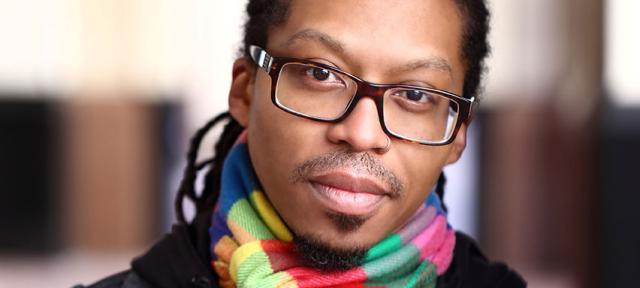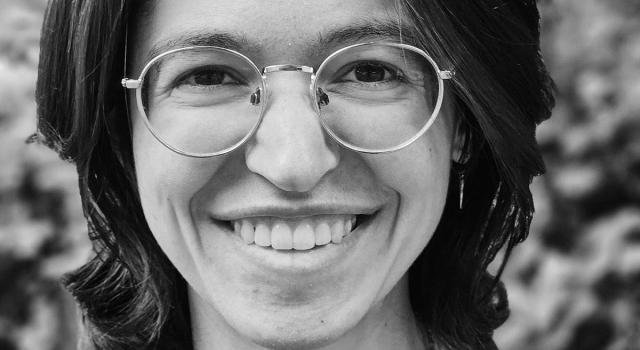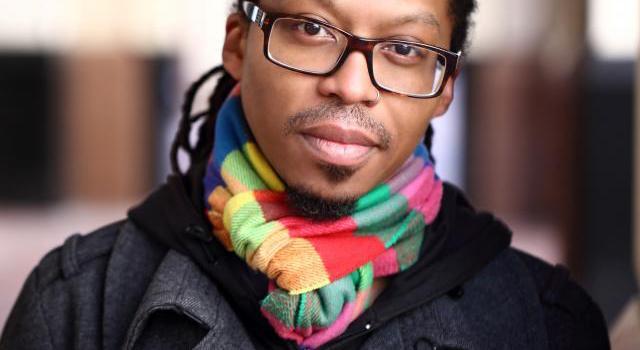Professor of Creative Writing Nathan McClain Embraces the Throughline of Anti-Racism in His Teaching (and Learning)

McClain teaches creative writing workshops — mostly poetry — and courses rooted in the study of African American literature, both canonical and contemporary.
What do you like most about teaching Hampshire students?
Hampshire students are wonderfully curious and inquisitive, but they’re also dissatisfied with simple answers or solutions. They appreciate nuance and complexity. And they’re rangy, driven, and experimental in their approaches to art and research, which, in turn, encourages faculty members to stretch themselves, to take exciting pedagogical leaps.
Do you have a favorite class?
I might choose Black Nature: Survey of African American Environmental Writing, which closely examines the pastoral poetic tradition through the lens of Black and brown writers. I enjoy teaching this course because my students are often amazed at how long Black poets have been writing about the natural world and the environment — well over four centuries — and the course also highlights the implicit bias in many of our primary and secondary schools, which teach eco-poetics from a primarily white and male perspective. Which is to say, the environment is seen largely as an idyllic space of respite and restoration. This course illuminates the dangers associated with the natural world — not because of nature itself, but because of what people have done with it.
What does being a faculty member at Hampshire enable you to do that you couldn't do elsewhere?
What differentiates Hampshire from other institutions is the invitation to teach courses that address our particular curiosities and interests at any given time, rather than teaching some preformulated general education requirements. That’s exciting. It allows students to recognize faculty as continual learners as well, and enables them to feel as though they’re taking part in some communal investigation.
I’m often teaching new courses because my questions expand, or I’m interested in examining a subject from a new vantage point. I teach a course on received poetic forms because I, too, am interested in what makes them effective and resonant. I also teach a course on Afro-surrealism, to resolve my questions around the topic. In this way, our teaching and scholarship mimic what we ask and expect of students.
How much emphasis do put on advising students in addition to teaching them? And what impact, for you, does the former have on the latter?
Advising is a tremendous portion of faculty work at Hampshire and is part of what makes our pedagogical approach unique. I happen to teach in a fairly popular area and discipline, and, as a result, advise a good number of students. Understanding how to provide individual and specialized support for one student is also deeply informative for what a classroom may need in terms of accommodations, communication, accessibility, and understanding. There's a symbiotic relationship, to my mind, between teaching and advising.
Has there been a Div III project that stood out?
One fascinating project was a story that vacillated between the digital world of a medieval, fantasy role–playing game and a small-town community. The project subtly tackled issues of race in video-game representation, whiteness as a metric of meritocracy, and gender and otherness, among other subjects. It was inventive, well written, well researched, resonant, and complex. The student went beyond a simple narrative, which is all the individual might have been required to complete. It remains memorable and noteworthy.
What do you think is so revolutionary about the College?
For the last several decades, Hampshire has sought to innovate what’s possible in a liberal arts education. Its student-led focus has been emulated by countless other programs, and Hampshire continues to challenge itself as an institution, particularly as it attempts to center anti-racism as a primary throughline of a student's experience. This is no easy or simple task. It requires diligence, willpower, commitment, and resources. We’re in the early stages of implementing this important work, and I’m excited to contribute to and deepen it, to see how broadly it can reach.
What do you hope future students come to Hampshire prepared to do/be/see/experience?
I think it’s easy to look at an institution that doesn’t submit letter grades or adhere to strict general education requirements and somehow equate that with a lack of seriousness and rigor. But nothing could be further from the truth. Future Hampshire College students should come prepared to engage in important and challenging work, which will necessitate curiosity, introspection, reflection, adaptation, and — probably most significant — unlearning. The experience can be life-changing, if you let it be.
Nathan McClain is the author of two collections of poetry: Previously Owned (Four Way Books, 2022) and Scale (Four Way Books, 2017), which was Silver Winner of a Human Relations Indie Book Award. Listen to him discuss his latest book in this conversation with fellow poet Virginia Konchan.



